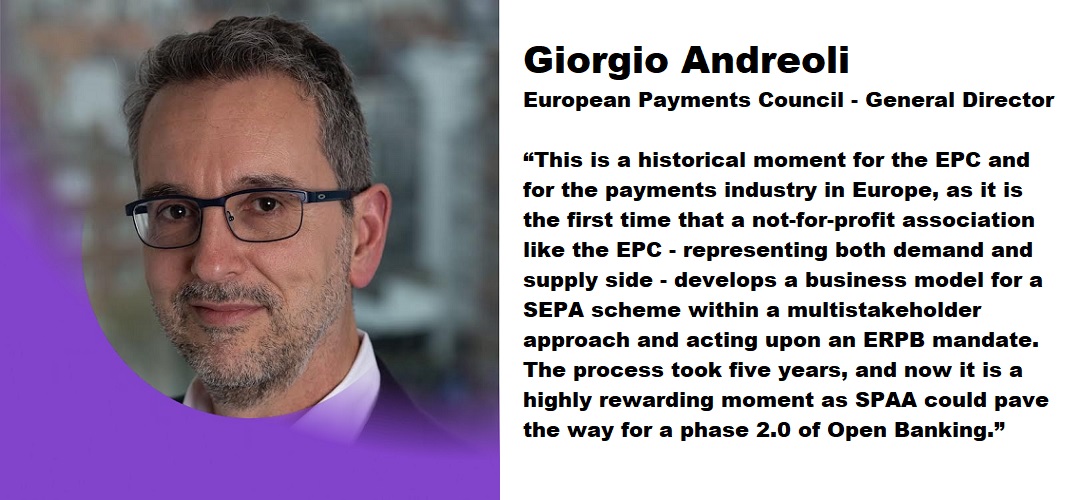
The SPAA scheme builds on the investments done in the context of the revised Payment Services Directive (PSD2) and covers the set of rules, practices and standards that allow the exchange of payment account-related data, and facilitate the initiation of payment transactions in the context of ‘value-added’ (‘premium’) services provided by Asset Holders (i.e. Account-Servicing Payment Service Providers (ASPSPs)) to Asset Brokers (e.g. Third Party Providers (TPPs)).
„The SPAA scheme rulebook, in line with the Euro Retail Payments Board (ERPB) mandate of June 2021, foresees the publication of an objective and transparent set of business conditions inclusive of a default remuneration model, which have been developed within a multi-stakeholder approach by an independent economic consultant, appointed following a public Request for Proposal (‘RFP’), and under the strategic guidance of the retail payment industry (supply and demand) as represented in the SPAA Multi-Stakeholder Group (MSG).” according to the press release.
Gijs Boudewijn – General Manager of the Dutch Payments Association and SPAA Co-Chair says: „I am extremely proud we have now created the right conditions for the development of a vibrant European open banking ecosystem in a multi stakeholder setting, and I thank the European Central Bank and the European Commission for their unwavering support of the project. We are only just beginning, and our next challenge is to actually bring SPAA to the market together.„
The default remuneration model, based on a sound cost-calculation methodology and an anonymised and aggregated data collection exercise, consists of two sets of Default Fees, namely Default Asset Fees related to the SPAA ‘premium’ assets and features that are exposed by a scheme participant ‘Asset Holder’ to a scheme participant ‘Asset Broker’, and a Default API Access Fee for the use of the ‘premium’ SPAA API. The availability of the ‘premium’ SPAA API does not in any way exclude nor prevent an Asset Holder and/or Asset Broker to use APIs already developed under PSD2 for ‘basic’ services.
Interested scheme applicants can discover the first version (v1.0) of the SPAA Default Fees prior to joining the scheme, by downloading them from the dedicated EPC webpage. The default remuneration model will apply amongst scheme participants, unless they have bilaterally agreed on a different (lower) amount.
Arturo Gonzalez Mac Dowell – Vice Chairman of the European Third Party Providers Association (ETPPA) and SPAA Co-Chair, adds: „I am thrilled to see that we’ve passed a major milestone by approving the first version of the business conditions. Together with v1.1 of the rulebook, this means we are technically ready to operate. This is the result of a massive five-years team effort that shows that the industry can get its act together. But this is probably just the end of the beginning. We now have to continue refining the model, and gathering interest to ensure that we will soon have asset holders and asset brokers serving merchants and consumers.”
The business conditions are expected to be revised early next year and on a periodic basis to remain fully aligned with market and regulatory developments, yet this first publication marks a significant milestone towards a new generation of payment services in Europe.
Giorgio Andreoli – Director General of the EPC comments: “This is a historical moment for the EPC and for the payments industry in Europe, as it is the first time that a not-for-profit association like the EPC – representing both demand and supply side – develops a business model for a SEPA scheme within a multistakeholder approach and acting upon an ERPB mandate. The process took five years, and now it is a highly rewarding moment as SPAA could pave the way for a phase 2.0 of Open Banking.”
Banking 4.0 – „how was the experience for you”
„To be honest I think that Sinaia, your conference, is much better then Davos.”
Many more interesting quotes in the video below: